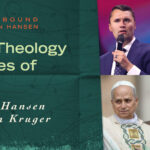How would you briefly describe your approach to preaching Christ from the OT?
To describe my approach to preaching Christ from the OT, I can best give you the definition I formulated in my Preaching Christ from the Old Testament: A Contemporary Hermeneutical Method, p. 10: Preaching Christ is “preaching sermons which authentically integrate the message of the text with the climax of God’s revelation in the person, work, and/or teaching of Jesus Christ as revealed in the New Testament.”
Do you regard this approach as controversial among other scholars or preachers? In other words, do you see a deficiency in gospel preaching that your work has addressed?
The deficiencies in gospel preaching that my work addresses are several.
- Text selection: many preachers fail to appreciate the importance of proper text selection. Instead of selecting a literary unit from the Bible, many use a fragment of a biblical text as basis for their sermons. The result is that instead of passing on the author’s intended message, they use (abuse) the text for their own purposes. Once a sermon derails because of faulty text selection, it is practically impossible to get the sermon back on track.
- Expository preaching: many preachers fail to employ genuine expository preaching that exposes the inspired author’s intended message. I think that some don’t really trust the text and its relevance for today.
- Preaching the textual theme: many preachers fail to look for the theme of the text and preach it. Instead they tend to explain and apply mere elements of the text.
- Moralizing: commentaries lead many preachers into what I call “character-imitation preaching.” Contrary to the biblical author’s intention, the biblical characters are presented as positive models to imitate or negative models to warn. Preachers neglect to focus on God’s story in and through these human characters.
- The context of the NT: many preachers do not connect the message of the OT text with God’s final revelation in the NT.
- Preaching Christ from the OT: Many preachers do not find it necessary or do not know how to preach Christ from the OT, except for the way of messianic promises being fulfilled in Christ.
Which historical figures have particularly helped form your contemporary hermeneutical method?
It started in seminary when I had to read Geerhardus Vos’s Biblical Theology. I was fascinated by his approach but also detected shortcomings. In graduate studies at the Free University in Amsterdam I was intrigued by the redemptive-historical approach developed by OT scholars such as Benne Holwerda (see my dissertation Sola Scriptura: Problems and Principles in Preaching Historical Texts). Since then I have benefited from the paradigm shift to literary analysis with redaction and rhetorical criticism, narrative criticism of people like Robert Alter, and the canonical approach developed by people such as Brevard Childs.
Why don’t more pastors feel comfortable preaching and teaching from the OT?
I think many pastors don’t feel comfortable preaching from the OT because it is more difficult than preaching from the NT; also some may feel that it is not relevant for today. Moreover, among Lutherans, the Law/Gospel distinction sometimes functions as an OT/NT distinction, with the result that people assume that there is no gospel in the OT. A few years ago I was invited to give some lectures in Norway on preaching Christ from the OT because the bishop had placed two (a total of two) OT texts on their Lutheran lectionary.
What’s the best piece of advice you can give preachers who want to preach the gospel from the OT?
The best advice I have for preachers who want to preach the gospel from the OT comes from Spurgeon’s Lectures to My Students, which I read while on sabbatical in England. Spurgeon said:
Don’t you know, young man, that from every town and every village and every hamlet in England, wherever it may be, there is a road to London? So from every text of Scripture there is a road to Christ. And my dear brother, your business is, when you get to a text, to say, now, what is the road to Christ? I have never found a text that had not got a road to Christ in it, and if ever I do find one, I will go over hedge and ditch but I would get at my Master, for the sermon cannot do any good unless there is a savor of Christ in it.
Not only is there a road to London from every village in England, there are usually several roads one can take. So it is with the ways in which preachers can move from the periphery of the Bible to its center, Jesus Christ. Depending on the text, one can legitimately move to Christ in the NT along these ways:
- Redemptive-historical progression: following the progression of redemptive history as it moves forward from the text’s historical setting to Jesus’ first or second coming.
- Promise-fulfillment: showing that the promise of a coming Messiah was fulfilled in Jesus’ first coming on earth.
- Typology: moving from an Old Testament redemptive event, person, or institution that functions as type prefiguring Jesus to the antitype, Jesus himself, by showing the analogies and escalations.
- Analogy: noting the similarity between the teaching of the text and the teaching of Jesus or noting the analogy between the author’s goal in sending this message and Jesus’ goal with one or more of his messages.
- Longitudinal themes: a technical term in biblical theology meaning that one traces the theme or a major theme of the text through the Old Testament to Jesus Christ in the New Testament.
- New Testament reference: moving to New Testament quotations of or allusions to the preaching text or to Jesus’ teachings on the same topic.
- Contrast: noting the contrast between the message of the Old Testament text and the teaching of Jesus in the New Testament.
Free eBook by Tim Keller: ‘The Freedom of Self-Forgetfulness’
 Imagine a life where you don’t feel inadequate, easily offended, desperate to prove yourself, or endlessly preoccupied with how you look to others. Imagine relishing, not resenting, the success of others. Living this way isn’t far-fetched. It’s actually guaranteed to believers, as they learn to receive God’s approval, rather than striving to earn it.
Imagine a life where you don’t feel inadequate, easily offended, desperate to prove yourself, or endlessly preoccupied with how you look to others. Imagine relishing, not resenting, the success of others. Living this way isn’t far-fetched. It’s actually guaranteed to believers, as they learn to receive God’s approval, rather than striving to earn it.
In Tim Keller’s short ebook, The Freedom of Self-Forgetfulness: The Path To True Christian Joy, he explains how to overcome the toxic tendencies of our age一not by diluting biblical truth or denying our differences一but by rooting our identity in Christ.
TGC is offering this Keller resource for free, so you can discover the “blessed rest” that only self-forgetfulness brings.


































